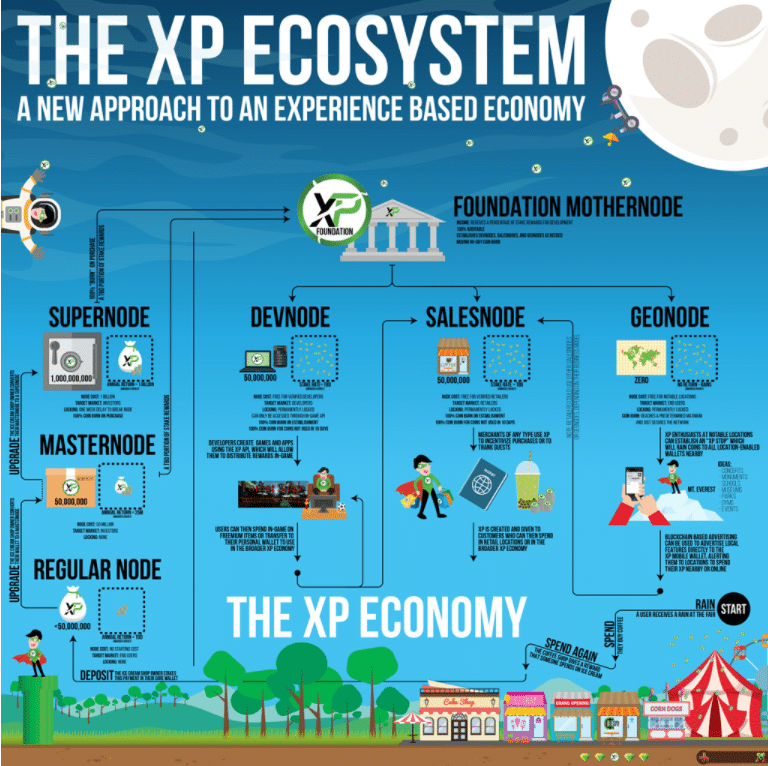- How Experience Points Works
- Experience Points Pentanode System
- Experience Points Use Cases
- Experience Points Team and Roadmap
- Experience Points Trading History
- Where to Buy Experience Points
- Where to Store Experience Points
- Final Thoughts
What is Experience Points?
What if you could go through life earning experience points for just going about your day? Picking up groceries (+500XP), shooting the bull with your buds on your favorite messaging app(+200XP), or sitting down for dinner with your sweetheart at your favorite Asian-American fusion gastropub (+1000XP).
If it sounds like you’ve entered some IRL video gaming landscape, don’t worry: this isn’t some virtual reality-ruled dystopia like Ready Player One. It is, however, a rewards system that will make life play out like an RPG–a role-playing game where the role is your own and the game is life itself.
It’s called Experience Points, and as its mission suggests, it wants to bring XP off the screen and into your daily routine. The project is building a sharing economy for all aspects of life, anything from daily purchases to tourism, all driven by the XP coin. With Experience points, distribution is limited only to adoption and acceptance; if an industry or service adopts the project’s model, you can earn XP coin for your everyday experiences.
How Experience Points Works
As one might expect, Experience Points has some immediate relevance for online gaming communities. It’s coin, XP, offers gaming ecosystems a self-sustaining economic model where it can be used for purchases, in-game rewards, and player-to-player transactions.
However, the Experience Points team wants to take this model and superimpose it on to real life interactions and transactions. Basically, consumers and community members can be rewarded in XP for interacting with a service or entity that has adopted the Experience Points platform, such as attending a concert or buying a meal at a restaurant that uses XP. Users can then spend their XP at participating locations, allowing them to take the experience they’ve gained and put it back into the XP-based economy.
Ultimately, Experience Points is looking to unite actors from all walks of life and facilitate cooperation between any industries willing to adopt it. The end product would be a real-life experience economy that links gaming, tourism, consumer industries, social media, entertainment, and more into a unified ecosystem.
[thrive_leads id=’5219′]
Experience Points Pentanode System
In order to secure network integrity and ensure distribution of XP across targeted industries, Experience Points employs a five-fold node system. Each node fulfills a specific function for the Experience Points ecosystem.
Masternodes:
Experience Points operates under a Proof of Stake model, so the masternodes serve your typical PoS consensus mechanism. They promise (roughly) a 50% annual return on investment and require a minimum 50mln XP to operate. Nodes that hold more than the minimum will receive the same hourly return (approximately 2,800XP). This disincentivizes hoarding and encourages users to establish more nodes to support the network.
Supernodes:
This node requires 1bln XP to operate and promises an approximate 200% annual return on investment. However, the 1bln committed XP will be burned upon setting up the node to keep operators from dumping coins when they reach a profit target. This ensures that only serious investors who believe in the future of the project will seek out supernodes.
Salesnodes:
These nodes will be distributed to vendors, retailers, and shop owners who want to adopt XP for payment and/or promotional reasons. They’ll function like masternodes, except that the stake cannot be split up, sold, or moved. Staking rewards will be used to distribute XP to customers per the vendor’s discretion, but these rewards will be capped at 150% of the original stake to make sure that funds are actually being redistributed and aren’t laying dormant.
Devnodes:
Devnodes are like salesnodes except for the online world, and they’ll be granted to developers to use with their online products. Like Salesnodes, the staked XP cannot be broken up or moved out of the node–the operator cannot access the funds at all. They can only be distributed through the XP API to promote circulation among platform users, and for devnodes, any staking rewards that are not redistributed within 10 days of being earned are immediately burned. This is meant to encourage developers to pump XP into the system and accelerate the coin’s adoption on their platform.
Geonodes:
Geonodes connect Experience Points users to the physical world. These nodes will be responsible for distributing XP to individuals who visit a specific location, monument, or other attraction. Simply by showing up and scanning a QR code, you could receive XP for visiting a popular tourist hot-spot or a museum, so long as it’s connected to a geonode.
Experience Points Use Cases
It should be noted that salesnodes, devnodes, and geonodes are staked with the specific purpose of circulating XP for the ecosystem’s adopters and consumers. As such, the coins are effectively (not literally) burned when staked as they are taken out of the circulating supply and used solely to redistribute staking rewards for users.
These rewards could be distributed across a number of industries, and here are just a few examples of potential use cases:
For salesnodes:
Say Molly owns a restaurant called Smack Yo Mama Mac. She wants to create a rewards system for her restaurant, wherein for every 10 meals a customer purchases, they receive 5,000XP. They can then use the XP to purchase their next meal if they desire. In another example, Angela runs a massage and hot spring spa in New Mexico. With Experience Points, she sets up a referral program that awards customers 3,000XP for each new person they bring to the spa.
For devnodes:
Carl runs a language learning messaging app that allows its users to interact with individuals in multilingual chat rooms. If one user offers another user helpful language coaching or tutoring on the app, that individual can tip the other in XP for the assistance. Carl also runs a recipe sharing app. Using XP, Carl can rewarded recipe contributors for their additions to the application’s recipe book.
For geonodes:
The tourist office in Edinburgh wants to encourage sightseeing, so they decide to set up an Experience Points genode for this purpose. Rewards could take many forms, including awarding users per distance walked on the Royal Mile, giving them 4,000XP for hiking Arthur’s Seat, or gifting them 2,000XP for visiting Edinburgh Castle.
Experience Points Team and Roadmap
EDIT: Since publishing, the project has removed the team section from their website.
On the project’s website, the only team information comes as a list of pseudonymous, emoji-represented members without LinkedIn profiles. This has given some investors pause in the past, but for what it’s worth, the team keeps an active Discord, Telegram, and Github. If they’re legit, it appears that they’d rather remain anonymous.
The project’s roadmap seems to focus on playful comedic illustrations to get its goals across, and these goals include rudimentary milestone descriptions and somewhat concrete deadlines. For 2018, the team hopes to tackle global on-boarding by offering developers and businesses a kit to get started with their own node, establish an Experience Points market for service/product listing and payment, and create an independent developers portal for the XP ecosystem.
Experience Points Trading History
At the peak of the 2017/2018 holiday bullrun, Experience Points peaked into the top 100 with a $1bln market cap. As it stands now, the coin is ranked #141 on CoinMarketCap with an asking price of nearly half a cent.
baseUrl = “https://widgets.cryptocompare.com/”;
var scripts = document.getElementsByTagName(“script”);
var embedder = scripts[ scripts.length – 1 ];
(function (){
var appName = encodeURIComponent(window.location.hostname);
if(appName==””){appName=”local”;}
var s = document.createElement(“script”);
s.type = “text/javascript”;
s.async = true;
var theUrl = baseUrl+’serve/v3/coin/chart?fsym=XP&tsyms=EUR,CNY,GBP,USD,BTC’;
s.src = theUrl + ( theUrl.indexOf(“?”) >= 0 ? “&” : “?”) + “app=” + appName;
embedder.parentNode.appendChild(s);
})();
Where to Buy Experience Points
To acquire some XP, you’ll have to go a bit off the beaten path. CoinExchange accounts for the majority of the coin’s trading volume, and you can trade for it with either BTC or DOGE (seriously). The next largest market comes from CrytpoBridge, but this only accounts for roughly 3% of 24/hr trading volume in BTC or MONA. XP does not trade for ETH on any of its host exchanges.
Where to Store Experience Points
The only wallets available for XP are the core wallets offered on the project website. These include software wallets for Windows, Mac, and Linux, along with a mobile wallet for Android and a paper wallet.
Final Thoughts
In its current stage of development, Experience Points is more geared towards online gaming platforms and services. Its upcoming development kit will make it easier for developers to integrate the coin into their games for in-game rewards and purchases, as well as giving users a coin to develop a player-driven economy.
Adopting this token for gaming purposes is one thing, but seeing XP in real world use is another. A cool concept? Maybe, even if a little bit quirky. Quixotic to think that the concept will become a reality? Potentially, but it all depends on whether or not some retailers, businesses, and industries see value in using a model like XP to incentivize business. If they do, and a few get the ball rolling, who knows how far it will go (and who/what it will pick up along the way).
All of this said, the lack of team transparency has troubled some, while others say you just need to get involved in the Experience Points community to get some screen time with the men and women behind the project.
Assuming the project is legit, watching it expand will be an experience in its own right. If it does expand well, who knows: it may mean that your next trip to New York could give you XP for taking a trip to Ellis Island or crossing Time’s Square.
Additional Resources:
Never Miss Another Opportunity! Get hand selected news & info from our Crypto Experts so you can make educated, informed decisions that directly affect your crypto profits. Subscribe to CoinCentral free newsletter now.













